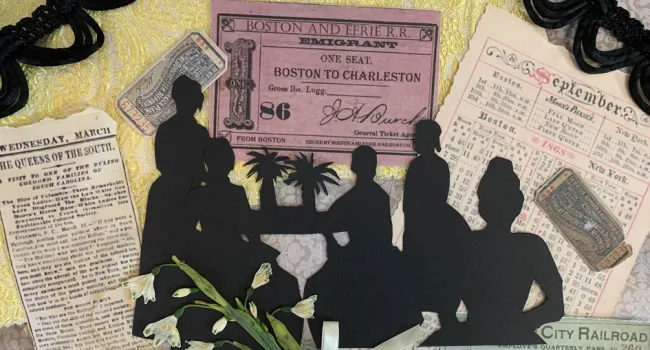The Civil War brought an abrupt change to the Rollin Family, ending a period where, according to Frances Rollin, “free people of color were at the zenith of their prosperity”. The Rollin family’s wealth became decimated by the Civil War, and the Rollin sisters are forced to remain in the north with family and friends. When the sisters return home, they are enthusiastically determined to embrace the new world which post-Civil War and Reconstruction brought to South Carolina. Frances Rollin takes a teaching post at the American Missionary Association’s Freedman’s School; later, the Penn Center in Beaufort. It was during her trip to the Penn Center when the Pilot Boy incident occurred. Frances is assisted during her lawsuit by Major Martin DeLaney, the highest ranking African American soldier in the Union Army. DeLaney is so taken by Frances’ determination and abilities, that he engages her to write his biography.
In 1867, Frances Rollin travels to Boston, where she writes her book on Martin DeLaney. The book is written under the pen name “Frank A. Rollin”. While in Boston, Frances becomes acquainted with abolitionists William Lloyd Garrison and Wendell Phillips, as well as intellectuals like William Nell, and Richard Greener. Kate and Lottie Rollin return to Charleston to establish a day school for colored boys and girls, which operates for only eighteen months. The sisters move to Columbia, where they teach at the Freedmen’s Bureau’s school, and pick up positions in South Carolina’s fledgling Reconstruction government, where they gain influence in the Republican controlled state.
Standards
- 4.4.CC Identify and evaluate the economic, political, and social changes experienced throughout the Civil War.
- 4.4.P Explain how emancipation was achieved as a result of civic participation.
- 4.5.CC Identify and evaluate the impact of economic, political, and social events on the African American experience throughout Reconstruction.
- 4.5.E Analyze multiple perspectives of the economic, political, and social effects of Reconstruction on different populations in the South and in other regions of the U.S.
- 5.2.CX Contextualize the post-war economic climate on the cultural landscape throughout the United States and South Carolina.
- 8.3.CC Analyze debates and efforts to recognize the natural rights of marginalized groups during the period of expansion and sectionalism.
- This indicator was designed to encourage inquiry into the continuities and changes of the experiences of marginalized groups such as African Americans, Native Americans and women, as the U.S. expanded westward and grappled with the development of new states.
- 8.4.CO Compare perspectives toward reform that engaged during the Progressive Era.
- This indicator was designed to encourage inquiry into how new state and federal Progressive legislation affected individuals and businesses in South Carolina and the US. The indicator was designed to promote inquiry into the new perspectives that emerged regarding social and political change.
- USHC.3.CE Assess the causes and effects of significant turning points in the Populist and Progressive era from 1877–1924.
Resources
You need to be logged in to listen to view this content. Create an account now; it's quick, easy, and free!
Log In to View




